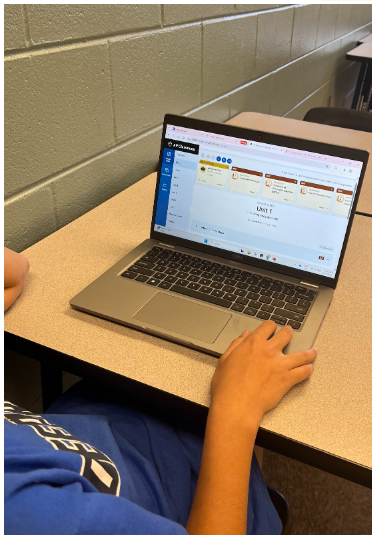
As the end of the school year approaches, first-time AP students are juggling notes, nerves, and study sessions while figuring out how to prepare for the academic challenge that is AP exams.
Students are taking different approaches when preparing for their exams. Some are breaking study time into shorter, manageable sessions, while others focus on reviewing past materials and strengthening weak areas. Many have set study schedules, but others prefer a more flexible approach, fitting in study sessions as needed. Despite the variety in their methods, all students are aiming for success.
AP exams are scored from one to five. Students must score a three or above to earn a qualifying score and potentially earn the college credit that comes from taking an AP course. Many colleges and universities require a four or five on the exam to earn credit for the course.
Freshman Libbie Leiner, who is preparing for the first time for both the AP Environmental Science and AP Human Geography exams, has found she is more successful while studying when using a schedule.
“I’ve been doing shorter sessions around 20 or 30 minutes a day, but it can be hard to stay consistent,” Leiner said.
In contrast to Leiner, sophomore Priscilla Chan, who is also preparing for the AP Human Geography exam, is taking a more relaxed approach.
“I don’t have a ‘set’ schedule for studying, as I don’t really study in general. However, for the AP test, which is a totally different matter, I’ll probably look through my past notes and focus mainly on strengthening my weaknesses,” Chan said.
Like many first-time AP students, Chan and Leiner find that the free-response section, commonly known as FRQs, are their biggest concern. The open-ended nature of these application or skill-based questions, combined with a strict scoring rubric, make them especially challenging. For many students, FRQs are the most intimidating part of the exam, because they require not only knowledge of the content, but also the ability to think critically under pressure and in a strictly timed environment.
“I’m most worried about the free response questions because they’re open ended with a set rubric,” Leiner said.
Chan pointed to the challenge many students face: not just memorizing information, but being able to apply it under pressure. She also noted that the process has been a reminder of how easy it is to procrastinate, a habit that many students can relate to.
“Something I’ve learned, and have already learned about myself, is how much procrastination I undergo before actually starting work,” Chan said.
Though the end-of-course exams can be stressful, they aren’t something that should deter you from taking an AP course. Many students find that the heavy workload isn’t as bad as they expected it to be and find the classes well worth it for the college credit.
“If I could go back to the beginning of this school year, I would still choose to take the class,” Chan said. “The material is really interesting, and besides the weekly quizzes and one-pagers, it’s really laid back.”
Like most of their peers, Chan and Leiner are hoping for high marks.
“I’m hoping to score a five on the exam, but I’ll also be happy with a four,” Chan said.
As AP exams near, students like Leiner and Chan will just need to push through the pressure one flashcard, packet, or YouTube video at a time.






